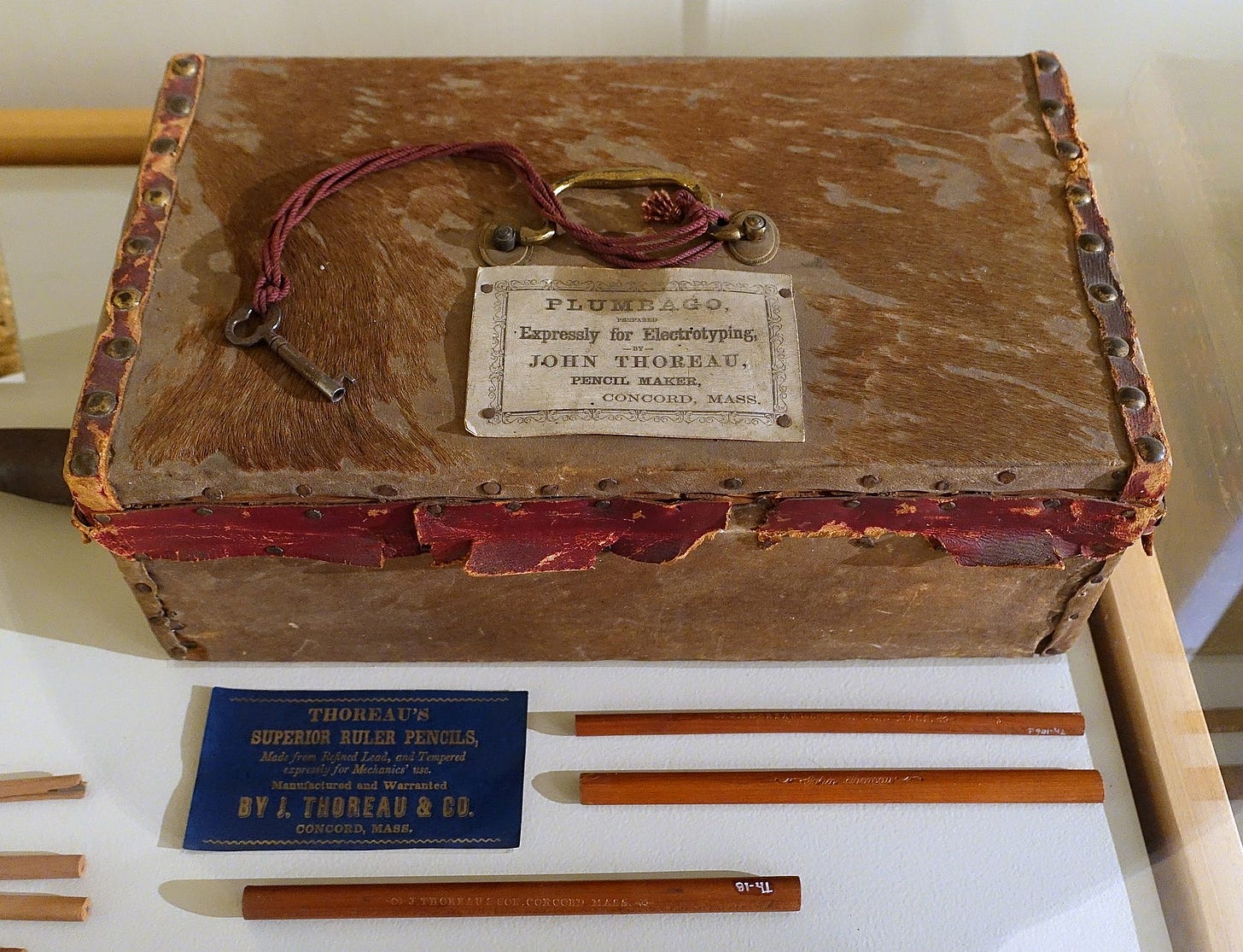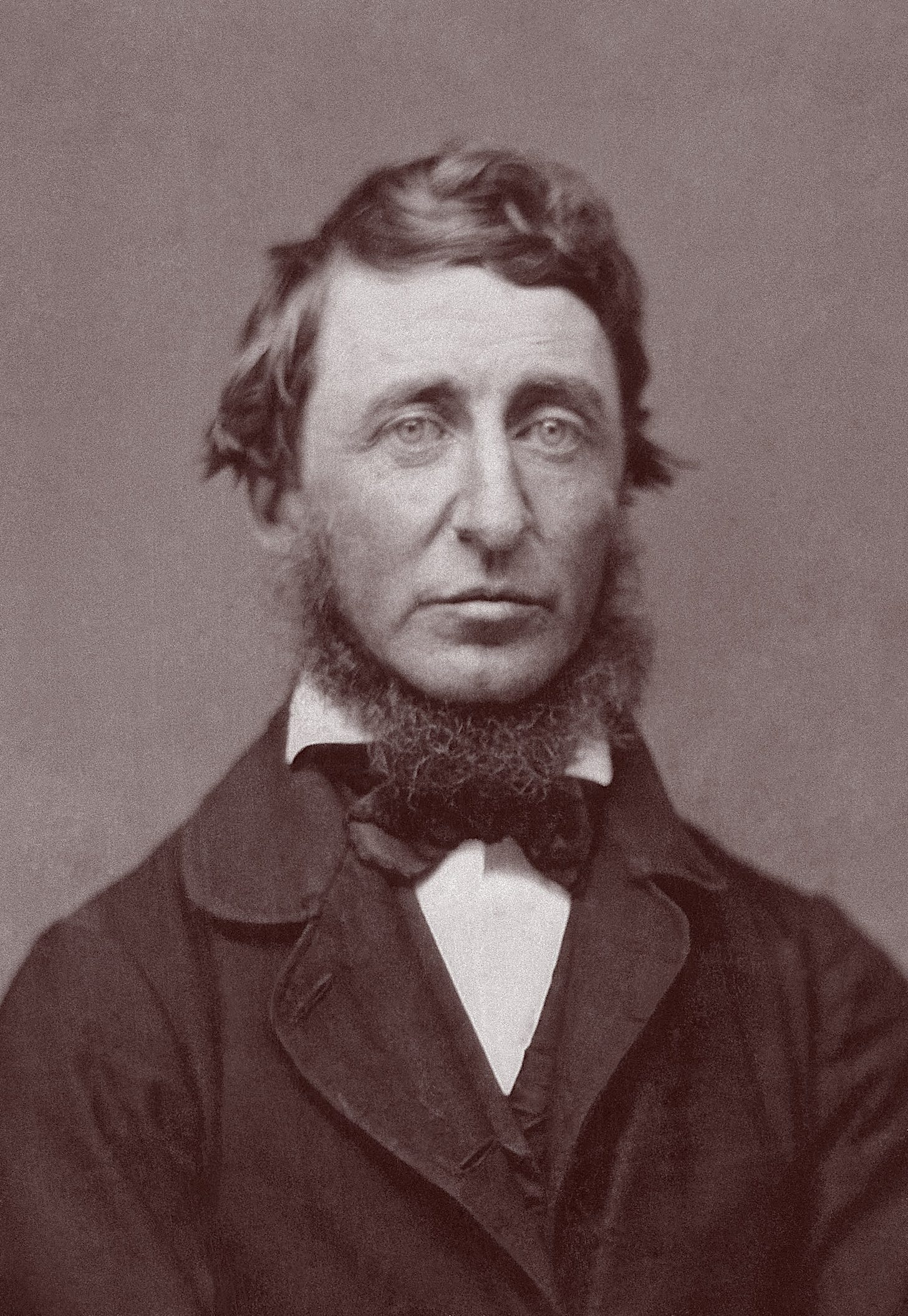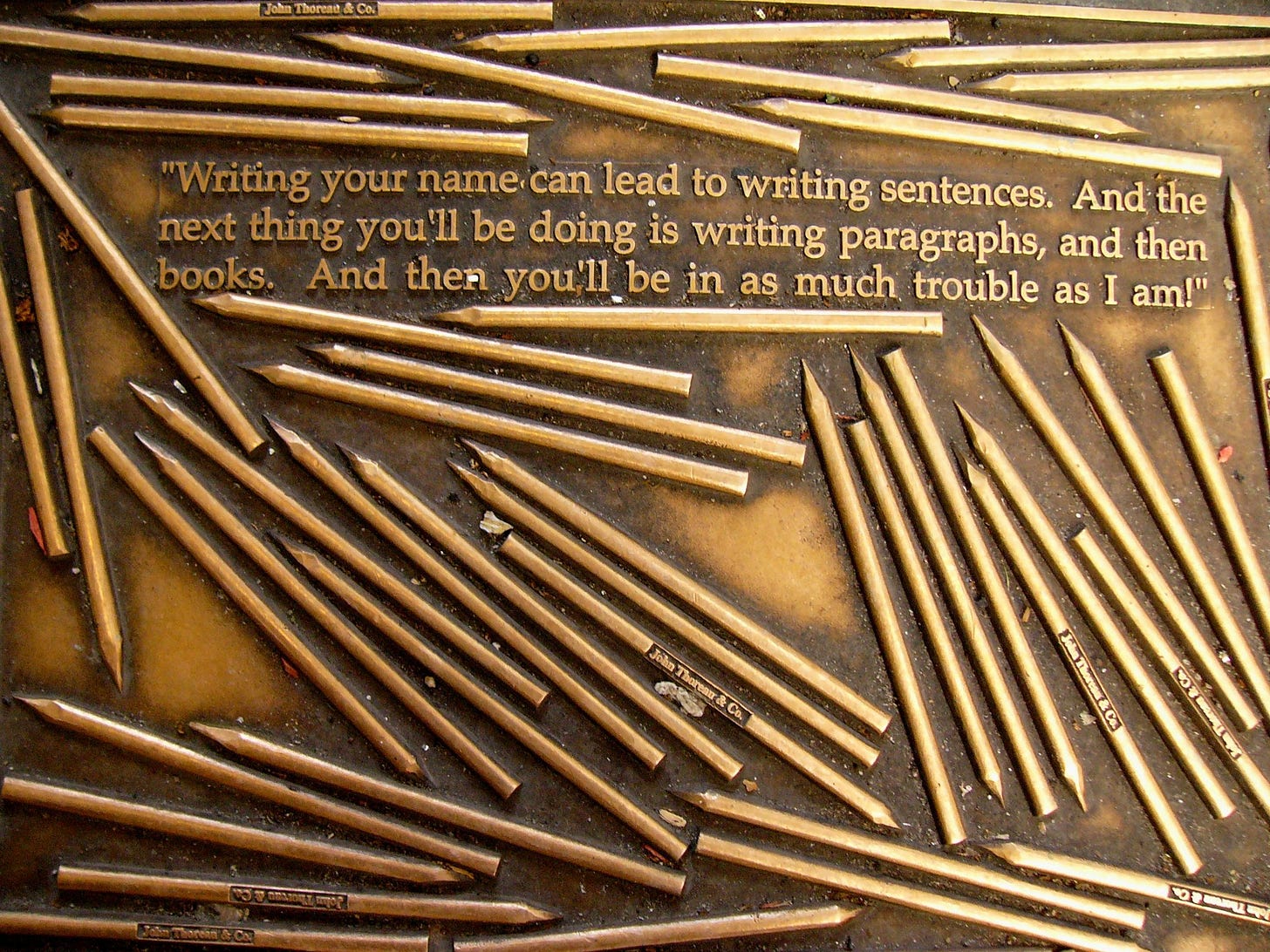The Power of the Pencil: “Behold, our butter stinketh!”
The great naturalist, civil rights activist & writer Henry David Thoreau could be all those things because he was, first, a principled business leader

Henry David Thoreau’s friend and mentor Ralph Waldo Emerson famously wrote: “Here once the embattled farmers stood/And fired the shot heard round the world.”
However, nine years before that skirmish in Concord, Massachusetts kicked off The Revolutionary War, 15 miles east, a different band of revolutionaries staged the first recorded student protest—over their inalienable right to slather fresh butter on their scones and crumpets. But rather than a musket ball fired by an unknown peasant-militiaman, this insurrectionist’s shot was fired by Asa Dunbar, Thoreau’s grandfather (and Emerson’s Concord neighbor). Harvard's administrators conceded the butter it served to students was rancid, but retaliated against a month of "violent, illegal, and insulting” protests, that demanded: “Give us, therefore, butter that stinketh not." The Massachusetts governor galloped over to quell “The Butter Rebellion,” but when the archons in charge of America’s oldest institution of higher learning (founded in 1636) punished Dunbar for being “insubordinate,” the students stormed out of the cafeteria to eat their hasty pudding in town.
Butter is big business, and always has been. And there’ve been other skirmishes, including one culminating in Congress passing a federal law in 1886. I use a few Harvard case studies in my Georgetown course, “Ethics in Action,” but for some reason The Butter Rebellion isn’t listed among Harvard Business School’s 50,000+ cases. Go figure.
There’s good sense in the adage “The business of America is business,” and it’s why the great management guru Peter Drucker said “If business can’t solve America’s problems, no one can.” When people defend the necessity of business, they aren't saying that all business leaders are saints. Far from it. There’ve always been wolves on Wall Street, and shysters trying to pass off yellow-colored beef tallow-derived margarine as the real McCoy. That’s why Drucker in particular focused on the need for businesses to work in league with schools, governments, NGOs & the military. His point was: without business generating output, employing people & making a profit, all the best intentions of all the other sectors of society won’t amount to anything. A corollary point is this: business leaders must adhere to a rigorous—and healthy—discipline; if they can’t produce stuff efficiently and profitably, they can’t survive. Corporations can’t paper over their leadership mistakes simply by printing money. Sustainability begins and ends with companies remaining going concerns by bringing in more money than they spend. I want clean water and clean air as much as the next guy, but commerce is key. Every great advance in civilization has occurred hand-in-hand with commerce; every great nation became so by providing goods and services to its stakeholders. The Bill & Melinda Gates Foundation is doing wonderful things—thanks to Microsoft. MacKenzie Scott has given away nearly $20 billion in record time—thanks to the vital role she played in Amazon’s success. This same process—of a business making money, then spreading the wealth to serve the Greater Good—has been repeated countless times since The Butter Rebellion, from Milton Hershey to Joan Kroc.

Which brings us back to the remarkable Thoreau. Most people know of him or think of him as a writer, an early environmentalist, or America’s first great advocate of civil disobedience. He was all of these. He’s had a profound influence on James Muir, Rachel Carson & Wendell Berry, and with the possible exception of Gandhi or Howard Thurman, he more than anyone informed the non-violent philosophy of the Rev. Dr. Martin Luther King, Jr. But it’s possible Carson never would’ve written Silent Spring (prompted by Walden) or King never would’ve written his Letter from Birmingham Jail (reminiscent of Thoreau’s essay and stint in Concord Jail)—had their inspiration not been very good at business.
How was Thoreau good in business?
He perfected his father’s pencil.
Much has been made of the profound impact of Johannes Gutenberg’s movable-type printing press invention in 1450, and rightly so. But a case can be made that Nicholas-Jacques Conte’s pencil, which he invented in 1795, has had a much bigger impact, as it truly democratized literacy and learning, thereby disseminating the best practices in every field of endeavor even more exponentially.
Being a gifted woodworker and gifted writer equipped Thoreau with a keen sense of both the Demand and Supply sides of the equation. Before he joined the family firm, it was floundering so much that his uncle, who’d discovered the graphite mine that was the foundation of the business—up and quit. Thoreau saved the day. But he was only able to take his 2-year sabbatical to wander around Walden Pond and reflect because he’d sold a lot of high-quality pencils.
Who & what influenced Thoreau?
I mean…in addition to his mother’s father, who led The Butter Rebellion…
Though scholars seldom agree on much, so far as I can tell, they all agree that Nature was Thoreau’s pivotal influence. The insects, birds, deer & chipmunks, streams and ponds, apples and huckleberries, white snow and warm sunshine, Spring’s aromatic blossoms…Fall’s blazing foliage…and much more.

Also, his father took him on long walks and taught him not just to appreciate the outdoors but to work with his hands in concert with different types of wood, saws, adzes, nails & hinges. His mother was at least as important, overriding her husband’s desire that the boy apprentice to a carpenter, rather than attend Harvard; then she stuck to her principles even though the pricey College tuition meant the family had to go deeply in debt. Beyond his family, there was a glittering array of mentors, friends and peers, chief among them Emerson, but also Henry Wadsworth Longfellow and Nathaniel Hawthorne.
What were Thoreau’s leadership principles?
1. Look to Nature for guidance and sustenance.
The cover of Walden; or Life in the Woods, says “I…propose…to brag as lustily as chanticleer in the morning, standing on his roost, if only to wake my neighbors up.” (“Chanticleer” = “rooster”). Thoreau also observed how spiders spun webs better than the best looms coming out of Manchester, nightingales sang more sweetly than the best church choir, Canada geese flew in V-formation, beavers worked together to build their watertight marvels of engineering, hawks prowled and owls nested, elder fish didn’t linger near the surface or beyond cover of the weeping willows, and honeybees followed their queens to achieve prodigious results. Annie Dillard was crowned with a Pulitzer (1977) for her ode to Thoreau in Pilgrim at Tinker Creek.
Every company of any size has a human resources department. But even the best HR department can’t hold a candle to the Nature Department, which provides all the true necessities of life: water; plants and animals for protein, medicine & clothing; forests and fields for the wood and stone for our homes, barns & coops; even the chattering crows as social companions. Plus, still, most of Nature’s bounty is free of charge. All that’s required is some sweat equity.
2. Self-reliance.
There wasn’t much Thoreau couldn’t build himself with his own two hands, given the right tools and sufficient materials. Starting at a very young age, he designed and built delightful birdhouses and watertight canoes, and, when he moved to Walden Pond, he designed and built his own cabin.
3. Equality.
Thoreau was thrown in jail for not paying his poll tax. He’d refused because he couldn’t countenance his money being used to prop up slavery, even if indirectly.
4. Simplicity.
Thoreau never gilded the lily. That’s why he also refused to pay for his Harvard diploma. He thought it a trifling waste of resources. “Let every sheep keep its skin,” he wrote. (Diplomas were etched on vellum, made from sheepskin.)
5. Stewardship.
Everything Thoreau did had a stewardship component, from using as little wood as possible to encase and funnel the mushy carbon so as to leave an intelligible trail of “writing,” to exposing government waste and abuse.
6. Reason over force.
Most experts say Thoreau was, if not America’s first proponent of non-violence, for sure the first of any prominence and impact. Like his contemporaries to the south, the Quakers of Pennsylvania, India’s Gandhi, a century later, and Dr. King, a quarter of a century after that, Thoreau believed deeply in not just the immorality of perpetrating violence against a fellow human (no matter the gender, race, or ethnicity)—but its ineffectiveness. Victories achieved by violence were always pyrrhic. Athens lost to Sparta on the battlefield but it’s the Athenian model of democracy that’s shaped civilization; all that remains of the totalitarian system is a pile of rubble in southern Greece, plus some gratuitous films and video games. Which is why, when he was teaching, rather than using corporal punishment as instructed—Thoreau up and quit.

Thoreau is sort of the flip side of John D. Rockefeller, as discussed in an earlier article: in that just the Greater Good stuff is remembered, not the role commercial acumen played in enabling all the good stuff. As Elon Musk noted recently in a conversation with Bill Maher, many of today’s elementary schoolchildren are being taught only that George Washington owned slaves; while it’s essential to portray past leaders “warts and all” (in the words of Oliver Cromwell, to his official portrait painter)—it’s equally important not to depict just the warts, any more than just the pretty bits.
Making pencils was a very dirty business (working with graphite was very messy), but it was also a noble vocation. It allowed teachers to teach, students to do their times tables, transcendentalists like Emerson to appeal to our intellect, poets like Walt Whitman to appeal to our hearts, Abolitionists like Harriett Tubman and Frederick Douglass to appeal to both, and countless farmers, inventors & engineers to design blueprints for the creation and delivery of the cornucopia of produce, goods and services that have propelled civilization…towards a brighter future.
References and Recommended Readings:
Thoreau’s Arrest For Tax Protesting Was Illegal — And It Changed The World
The forest was his cathedral: three new books deepen our understanding of Thoreau



You always do such a great job highlighting interesting characters in your articles! I always learn a lot!